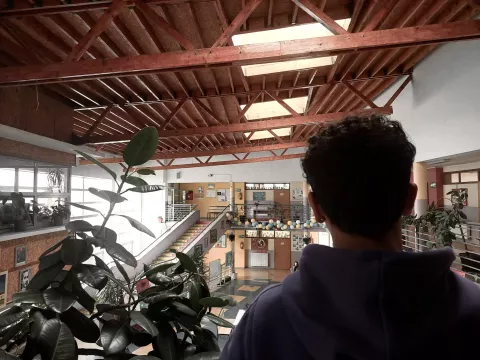Only 1 in 4 children in street situations is currently attending school, reads a new study released by UNICEF and the EU in Kosovo

Pristina, 28 February 2024 – UNICEF in Kosovo in partnership with the European Union in Kosovo has launched the Study of Children in Street Situations in Kosovo as part of the three-year partnership “Protecting Vulnerable Children in Kosovo”.
The keynote speakers at the launching event were the EU Ambassador in Kosovo, the Minister of Justice, the Minister of Education, Science, Technology and Innovation, the Deputy Minister of Internal Affairs and National Coordinator against Human Trafficking and was followed by open discussion with participants.
Children in street situations are amongst the most marginalized children. They experience severe violations of their rights before and during their time on the streets. These children face multiple deprivations, including lack of access to basic services, violence, abuse, neglect and exploitation, as well as vulnerabilities to alcohol and substance abuse.
The study, funded by the European Union in Kosovo, provides a baseline profile of children in street situations in Kosovo, in terms of what has driven them to the street, their family situations, their educational background, and their lives and work on the street, as well as their physical and mental health.
Across eight regions in Kosovo, a total of 130 children in street situations aged 6 to 17 years were interviewed. The study focused on the cities with the highest number of children in street situations: Prishtina/Priština, Ferizaj/Uroševac, Gjakovë/Ðakovica, Pejë/Peć, Prizren, Fushë Kosovë/Kosovo Polje, Dragash/Dragaš and Klinë/Klina. Over half (58 %) of the children were boys and 42% were girls. Few children reported having siblings less than 5 years of age on the streets (5 %), but 36 % reported having siblings in street situations that were in the age of 5 to 10 years.
For most of the children, 88% , poverty was the primary reason for their street-involvement, something that was echoed by parents during parental interviews, and by experts during consultations. Of all the children interviewed, only 20% have been on the street for less than 6 months. While more than half of the children have attended school at some point in their lives, currently, around 75% report that they do not go to school, and this was equally the case among boys and girls.
Around half of the children (46%t) state they engage in income generating activities on the streets, of which the majority (74%t) do this daily. When asked about the sources of income for the children in street situations and their families government assistance (66%) remains the most common, followed by begging/asking for handouts (61%) and providing services (32 %). The children who engage in income generation activities, in overwhelming numbers (83 %) give their income to their parents or buy food with it. This finding is in line with the finding that poverty is the main reason for children being in street situations.
The study’s findings and recommendations are critical to ensure that children in street situations and their families receive access to adequate services that their rights are respected. , and that policymakers receive the necessary information to develop strategies and make decisions to reach and assist vulnerable children, while also offering them the necessary support for their complete integration into society. It is essential that all responses to address the needs of children in street situations are firmly placed within a child rights-based approach in accordance with the Committee on the Rights of the Child General Comment No. 21 on Children in Street Situations (2017).
Media contacts
About UNICEF
UNICEF promotes the rights and wellbeing of every child, in everything we do. Together with our partners, we work in 190 countries and territories to translate that commitment into practical action, focusing special effort on reaching the most vulnerable and excluded children, to the benefit of all children, everywhere.
For more information about UNICEF and its work for children, visit www.unicef.org.




